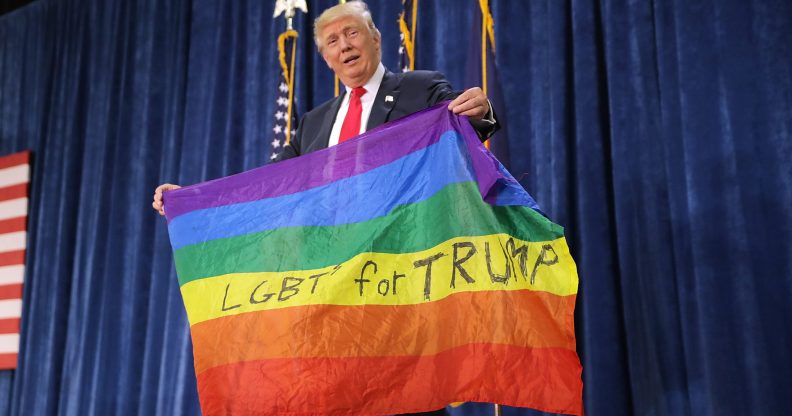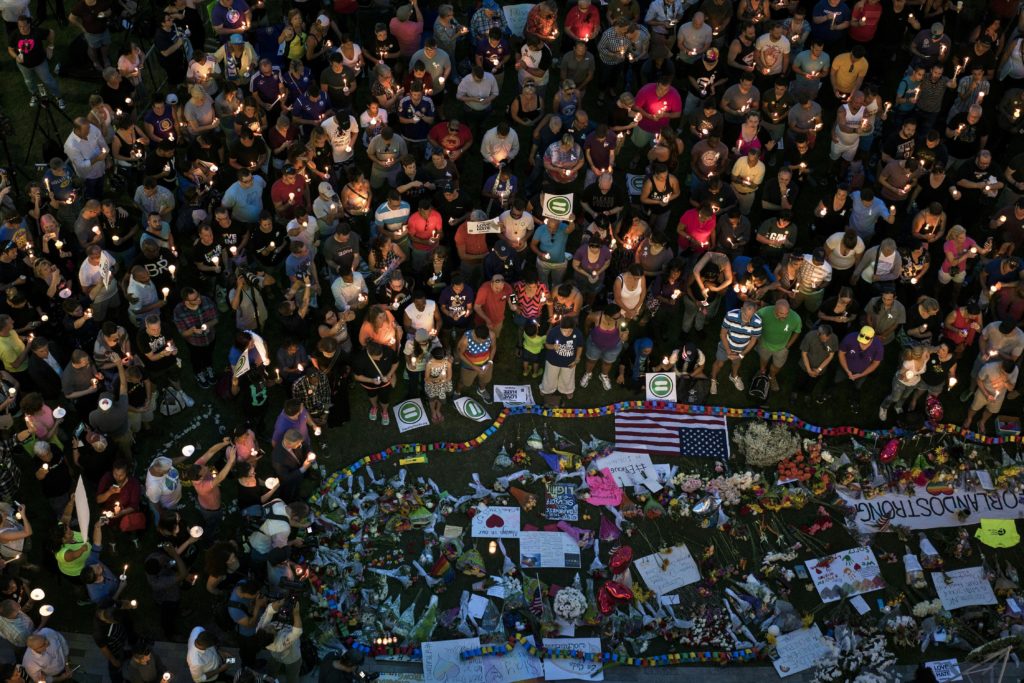On the anniversary of the Pulse nightclub shooting, Trump administration celebrates by cruelly erasing healthcare protections for trans patients

Donald Trump holds an LGBT+ Pride flag given to him by supporter. (Getty/ Chip Somodevilla)
On the four year anniversary of the Pulse nightclub shooting – when a man laid siege onto a queer Latinx club killing 49 people, many LGBT+ – the Trump administration Friday evening (June 12) brutally rolled-back healthcare protections for trans patients.
…Happy Pride Month!
Only two weeks into Pride Month, only weeks after Trump said absolutely nothing to usher in Pride month, only days after the Republican Party issued a brief celebrating the “unprecedented” pro-LGBT+ achievements of Donald Trump, only days after the deaths of two Black trans citizens and only days after Trump’s senior adviser and eldest daughter Ivanka tweeted a Pride message calling more “love”, her father gave one of America’s most vulnerable and marginalised communities some “love” by erasing more of their already eroded rights.
What will the rollback mean for trans patients?
The rule will impact trans patients’ ability to fight discrimination by doctors, medical facilities and health insurance providers.
It’s the latest in a string of nauseating U-turns of Obama-era policies, following a topsy-turvy ruling that has left the future of trans healthcare unknown.

In 2016, former president Barack Obama’s administration changed federal guidelines on healthcare to expand to sex-based protections to include gender identity.
But the Department of Health and Human Services issued a statement saying the final rule is based on “the plain meaning of the word ‘sex’ as male or female and as determined by biology.”
“All of these are essentially legislative changes that the Department lacked the authority to make,” the administration said of the 2016 changes in the final rule.
“They purported to impose additional legal requirements on covered entities that cannot be justified by the text of Title IX, and in fact are in conflict with express exemptions in Title IX.”
Trump administration grossly compares gender identity to political affiliation.
In the summary of the final rule, the agency responded to some barbs cast by queer activists who argued that, without a clear federal law protecting trans people in healthcare, officials in courts and agencies will be idly left to decide how far interpretations of the law should go in protecting minority rights.
The Department of Health and Human Service made a wonky comparison of gender identity being the same as a political affiliation.
“For example, in the unlikely event that a healthcare provider were to deny services to someone based solely on his or her political affiliation, the Department would not be able to address such denial of care under Section 1557,” the department said.

“Unlike other bases of discrimination, the categories of gender identity and sexual orientation (as well as political affiliation) are not set forth in those statutes.”
It then explained that the rule is designed for healthcare providers and insurances in mind, somehow. Arguing that trans healthcare is confusing for providers.
“The 2016 Rule risked masking clinically relevant, and sometimes vitally important, information by requiring providers and insurers to switch from a scientifically valid and biologically based system of tracking sex to one based on subjective self-identification according to gender identity,” the summary said.
“The 2016 Rule’s mandate cannot answer, for example, how a provider is to determine whether or when a transgender individual is entitled by law to be referred to a women’s mental health support group, a men’s mental health support group, either group, or both at the same time.”
Roger Severino, director of the HHS Office for Civil Rights, maintained in the announcement that “HHS respects the dignity of every human being.”
Well, we, for one, are relieved that these changes have been made in the throes of one of the biggest public health care crises rampaging across the US which is negatively impacting queer folk far more than non-queer demographics. Perfect timing, yes.

